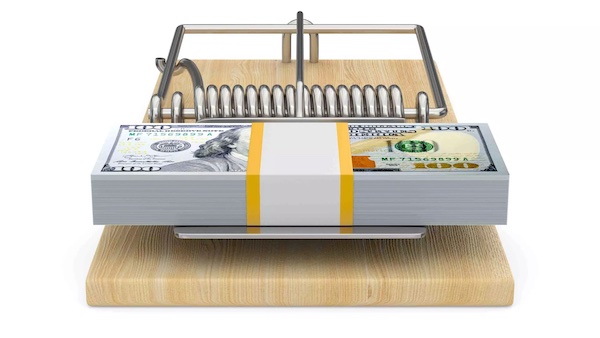Contribute
| Tax Traps Investors Need To Avoid |
12/16/2022
You may know the basics of investing in stocks, bonds and mutual funds but what about the many hidden tax traps that lie in wait for unwary investors? According to Howard Hook, CPA and certified financial planner at EKS Associates in Princeton, N.J., the biggest tax mistake investors make is not knowing these tax land mines even exist. Every dollar lost needlessly to taxes from one of these traps is money you won’t get back, says Hook. Short-term capital gains Long-term capital gains are more tax-efficient than those from short-term holdings. Gains on the sale of stocks, mutual funds and other investments held for more than a year are taxed favorably at 0%, 15% or 20%. Short-term gains from the sale of these investments held for a year or less are taxed at ordinary income rates, which currently top out at 37%. You don’t even have to sell one of your holdings to fall into this tax trap. Stock mutual funds that frequently buy and sell holdings may do it for you, potentially generating big short-term capital gains distributions in the process. Before you invest, check a mutual fund’s turnover ratio. The higher the turnover ratio, the higher the potential for short-term capital gains distributions. One way around this hazard is to keep high-turnover mutual funds in an r IRA or another tax-deferred account instead of a taxable account. Net investment income tax This additional 3.8% tax generally affects upper-income investors—, either single taxpayers with modified adjusted gross incomes over $200,000 or joint filers with modified AGIs over $250,000. The 3.8% tax is due on whichever is smaller: net investment income or the excess of modified AGI over the set income thresholds. Net investment income includes, among other things, taxable interest (but not tax-exempt interest), dividends, gains, passive rents, annuities and royalties. Like many mutual fund investors, you probably have dividends automatically reinvested to buy more shares, but each new purchase increases your tax basis in the fund. That, in turn, reduces the taxable capital gain (or increases the loss) when you redeem shares. If you don’t account for reinvested dividends in your tax basis, the dividends will be taxed twice—first in the year they were paid out and reinvested, and later, when they are included in the proceeds of the sale. If you’re not sure what your basis is, ask the fund for help. Funds often report to investors the tax basis of shares redeemed during the year, including reinvested dividends. If you’re thinking about investing in a dividend-paying mutual fund near the end of the year, check the fund’s dividend distribution schedule. Buying a fund shortly before the “record date†this year means you will get the dividend payout for 2022, which you will owe tax on when you file your return next year. Financially, however, you’re better off waiting to buy the fund until after the record date, because a fund’s share price falls by the amount of the dividend. You’re essentially prepaying your 2022 tax. Selling your portfolio duds to offset capital gains from sales of winners is a popular tax-savings strategy, but make sure not to run afoul of the sneaky wash-sale rule. You can’t write off a capital loss from a sale of securities if you buy substantially identical securities up to 30 days before or after the sale. If you do, any suspended loss is added to the tax basis of the replacement shares. The wash-sale rule can easily catch you by surprise—for example, selling a mutual fund at a loss 30 days after the date a dividend is reinvested or by buying stock in an IRA after selling the same stock at a loss in your taxable investment account. The rule, however, doesn’t apply to trades made completely within an IRA. If you sell securities in your IRA at a loss and then buy the same securities back using IRA funds within the 30-day period, you’re fine. Many investors ignore the state-tax implications of their investments until it’s too late, and that’s a mistake, Hook says. Most states don’t have favorable capital gains rates. They instead tax investment income at the same rates as wages and other ordinary income. Worse, some states don’t allow tax harvesting, or if they do, they may not let taxpayers carry forward unused capital losses each year. So be sure to check with your investment planner or tax adviser about the specific rules in your state.
Reinvested mutual fund dividends
Late-in-the-year purchases of mutual funds
Wash sales
State taxes
You may also access this article through our web-site http://www.lokvani.com/
